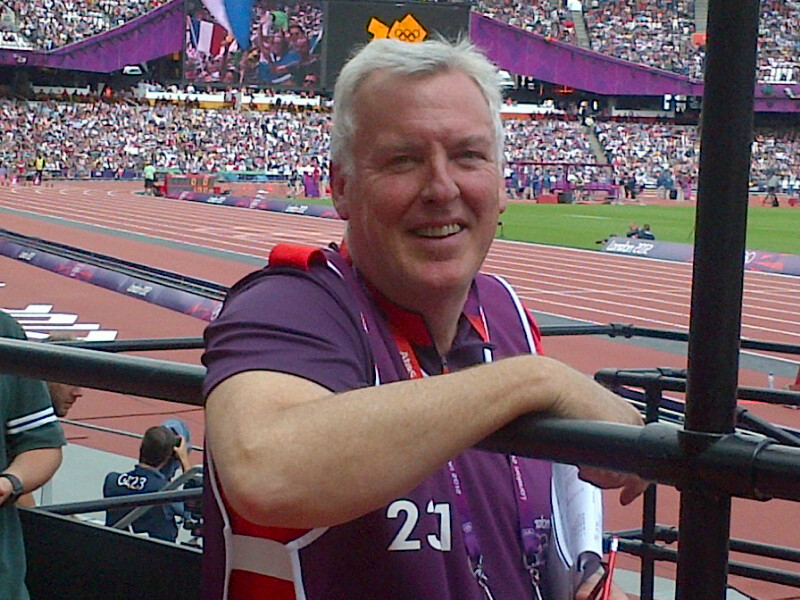On buses, in Tubes, at bars and restaurants, I’ve worn my uniform with pride. I’m surely challenging for the Olympic record in group photography for the number of snaps I’ve taken of families in front of the sign welcoming people to the Olympic Park.
My official role was “flash quote reporter” at the athletics for the Olympic News Service. Our job was to get quotes from each medallist, heat winner and important failure on behalf of reporters who could not get there.
The first question anyone asks is: “Did you get to meet Usain Bolt?” The answer is, of course I did, but more of that later.
We were a mixed crew including a student from John O’Groats, two former PE teachers from Lancashire, a Brazilian whose cousin won silver in the pool and a journalist taking a holiday from his real job who was camping at Eton Manor Rugby Club for a tenner a night. And me, a journalist who had covered the Los Angeles Games in 1984. This time I was doing it for nothing. Well, no money but a whole lot of fun.
The training took a few days and we practised at the British University Athletics Championship on a wet weekend in May. With just a drizzle of spectators, the stadium looked pretty glum.
Who could imagine the transformation when it opened for that first day of Olympic track and field. We were buzzing as tens of thousands of spectators filled it to the brim for the first heats.
Four of us spent the first 90 minutes stapling start sheets together because the copying machines didn’t have a staple option. Incredibly, even in the bowels of the stadium the no-visible-company-name-unless-you-are-a-sponsor rule is in force. The copying machines had their logos taped over. I had a peek. Xerox.
Most of our time was spent in the Mixed Zone, the tunnel beyond the finish line down which every athlete has to go. Athletes on one side of the barrier, reporters on the other.
Nobody has to talk to the press but most were happy to. The job was to pick up a quick quote, or get a translation if needed, and leg it back to the office and dictate it to a staffer, who would relay it to the press centre.
Some of the time we were out in the stadium pinching ourselves with delight and pinching (with permission) quotes from the broadcasters’ podium.
When Phil Jones, the delightful BBC trackside commentator, bagged an athlete one of us would kneel just out of camera and take down the quotes.
Phil has been criticised by some for his touchy-feely way with athletes. As he pointed out to me, he gets hold of them to make sure they are in shot and because they are often a little wobbly.
I thought I had timed my run to perfection to be on the broadcast podium with a perfect view for Bolt’s 100 metres final. With a few minutes to go I saw him come on the track and start his vaudeville routine.
And then Ezekiel Kemboi, gold medal winner in the 3,000 metres steeplechase, chose that moment to walk past and Phil, ever the pro, stopped him for a quote, which I then had to run back to file. As a result I had to watch the 100 metres final on the TV in the Mixed Zone.
Now to the Bolt interview. I lied, I almost met him. He was there and somewhere in the mêlée of hundreds of the world’s reporters was me. To be precise I, and many others, interviewed a loud speaker that relayed the great man’s words. It was a bizarre sight — people holding up their recorders to the speaker with their backs to Bolt. My most unlikely contribution was one night when the Dominican Republic’s Minister for Sport used my charger to fire up his BlackBerry so that Felix Sanchez could receive the thanks of his President for his victory in the 400 metres hurdles. I left them huddled in the zone waiting for the connection.
Now it is over and our band are going their separate ways, all proud to have been part of the best show on Earth. On the Tube, I met two fellow Game Makers — one a Norwich nurse who had been on the medical team at the hockey, and a shift manager from Bury who helped at the table tennis and managed to see 20 minutes of it one day. Many of my 70,000 colleagues stood outside or minded a door and never saw anything, but all felt it worthwhile.
The Big Purple and Red Society really did work. Let’s keep it that way.
Charlie Burgess is a former sports editor of the Independent and an Olympic volunteer
This article was originally published in The Times

 RSS Feed
RSS Feed
